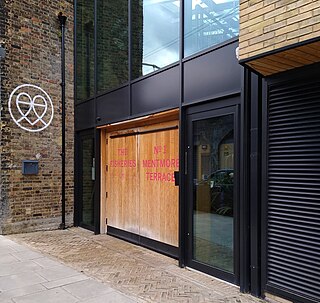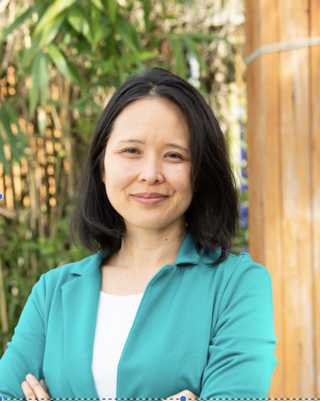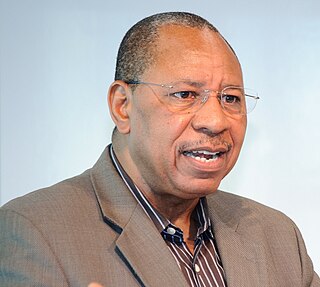Related Research Articles
A green economy is an economy that aims at reducing environmental risks and ecological scarcities, and that aims for sustainable development without degrading the environment. It is closely related with ecological economics, but has a more politically applied focus. The 2011 UNEP Green Economy Report argues "that to be green, an economy must not only be efficient, but also fair. Fairness implies recognizing global and country level equity dimensions, particularly in assuring a Just Transition to an economy that is low-carbon, resource efficient, and socially inclusive."

REN21 is a policy network and a multistakeholder governance group which is focused on renewable energy policy.

C40 Cities Climate Leadership Group is a group of 96 cities around the world that represents one twelfth of the world's population and one quarter of the global economy. Created and led by cities, C40 is focused on fighting the climate crisis and driving urban action that reduces greenhouse gas emissions and climate risks, while increasing the health, wellbeing and economic opportunities of urban residents.
An energy superpower is a country that supplies large amounts of energy resources to a significant number of other countries, and therefore has the potential to influence world markets for political or economic gains. Energy superpower status might be exercised, for example, by significantly influencing the price on global markets, or by withholding supplies. Most recently, the term "energy superpower" is increasingly used to characterize nations at the forefront of energy transition and the development of renewable energy resources.

The Renewable Energy and Energy Efficiency Partnership (REEEP) is a Vienna-based Quasi-International Organisation that advances markets for renewable energy and energy efficiency with a particular emphasis on the emerging markets and developing countries.

Ember, formerly Sandbag or Sandbag Climate Campaign, is an independent global energy think tank that uses data and policy to accelerate the clean energy transition. Headquartered in the UK, the organisation was launched in 2008 by Bryony Worthington and was the first member of The Guardian's Environment Network.

The Youth Climate Movement (YouNGO) or International Youth Climate Movement (IYCM) refers to an international network of youth organisations that collectively aims to inspire, empower and mobilise a generational movement of young people to take positive action on climate change.
Friends of the Earth Europe (FoEE) is the European branch of the world's largest grassroots environmental network, Friends of the Earth International (FOEI). It includes 33 national organizations and thousands of local groups.

An energy transition is a significant structural change in an energy system regarding supply and consumption. Currently, a transition to sustainable energy is underway to limit climate change. It is also called renewable energy transition. The current transition is driven by a recognition that global greenhouse-gas emissions must be drastically reduced. This process involves phasing-down fossil fuels and re-developing whole systems to operate on low carbon electricity. A previous energy transition took place during the industrial revolution and involved an energy transition from wood and other biomass to coal, followed by oil and most recently natural gas.
Energy democracy is a concept developed within the environmental justice movement that pairs the renewable energy transition with efforts to democratize the production and management of energy resources— including the social ownership of energy infrastructure, decentralization of energy systems, and expansion of public participation in energy-related policymaking. Energy democracy calls for greater participation in transitions and is being used in literature to describe an overall ongoing democratic transition. Energy democracy and climate justice are increasingly associated. Rather than view decarbonization as a purely technological challenge, energy democracy identifies the renewable energy transition as an opportunity to redistribute political and economic power toward egalitarian ends.

Most of Kenya's electricity is generated by renewable energy sources. Access to reliable, affordable, and sustainable energy is one of the 17 main goals of the United Nations’ Sustainable Development Goals. Development of the energy sector is also critical to help Kenya achieve the goals in Kenya Vision 2030 to become a newly industrializing, middle-income country. With an installed power capacity of 2,819 MW, Kenya currently generates 826 MW hydroelectric power, 828 geothermal power, 749 MW thermal power, 331 MW wind power, and the rest from solar and biomass sources. Kenya is the largest geothermal energy producer in Africa and also has the largest wind farm on the continent. In March 2011, Kenya opened Africa's first carbon exchange to promote investments in renewable energy projects. Kenya has also been selected as a pilot country under the Scaling-Up Renewable Energy Programmes in Low Income Countries Programme to increase deployment of renewable energy solutions in low-income countries. Despite significant strides in renewable energy development, about a quarter of the Kenyan population still lacks access to electricity, necessitating policy changes to diversify the energy generation mix and promote public-private partnerships for financing renewable energy projects.
Joseph Mithika Mwenda, commonly known as Mithika Mwenda or simply Mzalendo, is the Kenyan-born co-founder of the African climate change activism organisation Pan African Climate Justice Alliance (PACJA). He has been a climate advocate for over 10 years.

The European Green Deal, approved in 2020, is a set of policy initiatives by the European Commission with the overarching aim of making the European Union (EU) climate neutral in 2050. The plan is to review each existing law on its climate merits, and also introduce new legislation on the circular economy, building renovation, biodiversity, farming and innovation.
Titilope Gbemisola Akosa, popularly known as Titilope Akosa, is a Nigerian environmentalist, climate justice advocate, lawyer, gender and social inclusive expert, and human rights activist. She is the founder and executive director for the non-governmental sustainability organization Centre for 21st Century Issues (C21st). She heads the law firm Titi Akosa & Co Nigeria. In 2015, she was the spokesperson for women and gender non-governmental organizations at the 2015 Paris Climate Treaty on the topic 'Towards a Gender Responsive Green climate fund in Africa'.
Green recovery packages are proposed environmental, regulatory, and fiscal reforms to rebuild prosperity in the wake of an economic crisis, such as the COVID-19 pandemic or the Global Financial Crisis (GFC). They pertain to fiscal measures that intend to recover economic growth while also positively benefitting the environment, including measures for renewable energy, efficient energy use, nature-based solutions, sustainable transport, green innovation and green jobs, amongst others.
Green grabbing or green colonialism is the foreign land grabbing and appropriation of resources for environmental purposes, resulting in a pattern of unjust development. The purposes of green grabbing are varied; it can be done for ecotourism, conservation of biodiversity or ecosystem services, for carbon emission trading, or for biofuel production. It involves governments, NGOs, and corporations, often working in alliances. Green grabs can result in local residents' displacement from land where they live or make their livelihoods. It is considered to be a subtype of green imperialism.

Khanh Pham is an American politician and activist serving as a member of the Oregon House of Representatives from the 46th district. She assumed office on January 11, 2021.
The European Climate, Environment and Infrastructure Executive Agency (CINEA) is the European Commission agency which manages decarbonisation and sustainable growth. It is the successor organisation of the Innovation and Networks Executive Agency (INEA). Established on 15 February 2021, with a budget of €50 billion for the 2021-2027 period, it started work on 1 April 2021 in order to implement parts of certain EU programmes. The Agency will have a key role in supporting the European Green Deal, with a focus on creating synergies to support a sustainable, connected, and decarbonised Europe.
In this article, NGOs in West Africa will be divided into three categories: African national NGOs, African international NGOs, and non-African international NGOs. NGOs stand for non-governmental organizations. These organizations are mostly non-profit and mostly work independently from the government, they have specific aims that range from human rights, finance, health, education and more. There are many non-governmental organizations in West Africa, and much activity between these countries, organizations and the rest of the world.

Youba SokonaFAAS FTWAS (born 23 May 1950) is a Malian expert in the fields of energy and sustainable development, particularly in Africa. He has been the vice-chair of the Intergovernmental Panel on Climate Change (IPCC) since October 2015 and a lead author at the IPCC since 1990.
References
- ↑ "About us". Panafrican Climate Justice Alliance. 24 September 2020. Retrieved 2021-09-03.
- ↑ "Pan African Climate Justice Alliance (PACJA)". www.onlinevolunteering.org (in French). Retrieved 2021-09-04.
- ↑ "EU and France hijacking Africa's renewable energy initiative, allege civil society groups". www.downtoearth.org.in. Retrieved 2024-03-07.
- ↑ "Climate activists tell Europe to stop 'hijacking' African energy plans | Africa Times". africatimes.com. 2017-06-27. Retrieved 2021-09-04.
- ↑ "ACCER Awards 2020". Panafrican Climate Justice Alliance. Archived from the original on 2021-11-05. Retrieved 2021-09-04.
- ↑ "2014 Climate Change and Environmental Reporting Awards launched". Modern Ghana. Retrieved 2021-09-04.
- ↑ "Nairobi Summer School on Climate Justice (NSSCJ) - PACJA - Panafrican Climate Justice Alliance". 2022-10-01. Retrieved 2024-02-20.
- ↑ "African CSOs launch School on Climate Justice". The Africa Science News Service. August 30, 2021. Retrieved 3 March 2024.
{{cite news}}: CS1 maint: url-status (link) - ↑ "Africa Coalition on Sustainable Energy (ACSEA) - PACJA - Panafrican Climate Justice Alliance". 2022-10-01. Retrieved 2024-03-03.
- ↑ "GUARD AFRICA - PACJA - Panafrican Climate Justice Alliance". 2022-10-24. Retrieved 2024-03-03.
- ↑ Nkurunziza, Michel (December 28, 2022). "2022: A look at 15 major climate finance flows in Rwanda". The New Times. Retrieved March 2, 2024.
{{cite news}}: CS1 maint: url-status (link) - 1 2 Lidigu, Leon (November 17, 2022). "Countries get Sh156m climate change cash for four-year period". Daily Nation. Retrieved March 24, 2024.
{{cite news}}: CS1 maint: url-status (link) - ↑ "AFDAN. - PACJA - Panafrican Climate Justice Alliance". 2023-01-30. Retrieved 2024-03-24.
- ↑ Ugwu, Chidi (October 6, 2023). "AACJ, OXFAM, Netherlands Embassy Seek Partnership With FG To Address Climate Injustice In Africa". Daily Independent. Retrieved March 24, 2024.
{{cite news}}: CS1 maint: url-status (link) - 1 2 "The African Activists for Climate Justice (AACJ) - PACJA - Panafrican Climate Justice Alliance". 2022-10-01. Retrieved 2024-03-24.